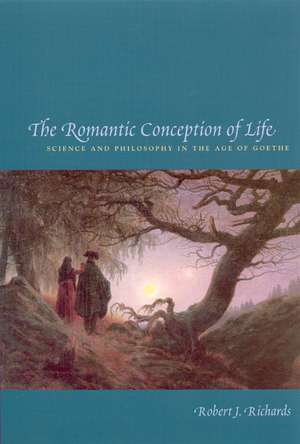The Romantic Conception of Life: Science and Philosophy in the Age of Goethe
Autor Robert J. Richardsen Limba Engleză Paperback – sep 2004
"All art should become science and all science art; poetry and philosophy should be made one." Friedrich Schlegel's words perfectly capture the project of the German Romantics, who believed that the aesthetic approaches of art and literature could reveal patterns and meaning in nature that couldn't be uncovered through rationalistic philosophy and science alone. In this wide-ranging work, Robert J. Richards shows how the Romantic conception of the world influenced (and was influenced by) both the lives of the people who held it and the development of nineteenth-century science.
Integrating Romantic literature, science, and philosophy with an intimate knowledge of the individuals involved—from Goethe and the brothers Schlegel to Humboldt and Friedrich and Caroline Schelling—Richards demonstrates how their tempestuous lives shaped their ideas as profoundly as their intellectual and cultural heritage. He focuses especially on how Romantic concepts of the self, as well as aesthetic and moral considerations—all tempered by personal relationships—altered scientific representations of nature. Although historians have long considered Romanticism at best a minor tributary to scientific thought, Richards moves it to the center of the main currents of nineteenth-century biology, culminating in the conception of nature that underlies Darwin's evolutionary theory.
Uniting the personal and poetic aspects of philosophy and science in a way that the German Romantics themselves would have honored, The Romantic Conception of Life alters how we look at Romanticism and nineteenth-century biology.
Integrating Romantic literature, science, and philosophy with an intimate knowledge of the individuals involved—from Goethe and the brothers Schlegel to Humboldt and Friedrich and Caroline Schelling—Richards demonstrates how their tempestuous lives shaped their ideas as profoundly as their intellectual and cultural heritage. He focuses especially on how Romantic concepts of the self, as well as aesthetic and moral considerations—all tempered by personal relationships—altered scientific representations of nature. Although historians have long considered Romanticism at best a minor tributary to scientific thought, Richards moves it to the center of the main currents of nineteenth-century biology, culminating in the conception of nature that underlies Darwin's evolutionary theory.
Uniting the personal and poetic aspects of philosophy and science in a way that the German Romantics themselves would have honored, The Romantic Conception of Life alters how we look at Romanticism and nineteenth-century biology.
Preț: 189.25 lei
Nou
Puncte Express: 284
Preț estimativ în valută:
36.21€ • 37.90$ • 30.14£
36.21€ • 37.90$ • 30.14£
Carte disponibilă
Livrare economică 10-24 martie
Livrare express 22-28 februarie pentru 40.50 lei
Preluare comenzi: 021 569.72.76
Specificații
ISBN-13: 9780226712116
ISBN-10: 0226712117
Pagini: 606
Ilustrații: 5 color plates, 39 halftones, 10 line drawings
Dimensiuni: 152 x 229 x 41 mm
Greutate: 0.79 kg
Ediția:1
Editura: University of Chicago Press
Colecția University of Chicago Press
ISBN-10: 0226712117
Pagini: 606
Ilustrații: 5 color plates, 39 halftones, 10 line drawings
Dimensiuni: 152 x 229 x 41 mm
Greutate: 0.79 kg
Ediția:1
Editura: University of Chicago Press
Colecția University of Chicago Press
Notă biografică
Robert J. Richards is a professor of history, philosophy, and psychology and director of the Fishbein Center for the History of Science at the University of Chicago. He is the author of Darwin and the Emergence of Evolutionary Theories of Mind and Behavior and The Meaning of Evolution: The Morphological Construction and Ideological Reconstruction of Darwin's Theory, both published by the University of Chicago Press.
Cuprins
Illustrations
Acknowledgments
Prologue
1. Introduction: A Most Happy Encounter
PART ONE - THE EARLY ROMANTIC MOVEMENT IN LITERATURE PHILOSOPHY, AND SCIENCE
2. The Early Romantic Movement
3. Schelling: The Poetry of Nature
4. Denouement: Farwell to Jena
PART TWO - SCIENTIFIC FOUNDATIONS OF THE ROMANTIC CONCEPTION OF LIFE
5. Early Theories of Development: Blumenback and Kant
6. Kielmeyer and the Organic Powers of Nature
7. Johann Christian Reli's Romantic Theories of Life and Mind, or Rhapsodies on a Cat-Piano
PART THREE - GOETHE, A GENIUS FOR POETRY, MORPHOLOGY, AND WOMEN
10 - The Erotic Authority of Nature
11 - Goethe's Scientific Revolution
12 - Conclusion: The History of a Life in Art and Science
PART FOUR - EPILOGUE
13. The Romantic Conception of Life
14. Darwin's Romantic Biology
Bibliography
Index
Acknowledgments
Prologue
1. Introduction: A Most Happy Encounter
PART ONE - THE EARLY ROMANTIC MOVEMENT IN LITERATURE PHILOSOPHY, AND SCIENCE
2. The Early Romantic Movement
3. Schelling: The Poetry of Nature
4. Denouement: Farwell to Jena
PART TWO - SCIENTIFIC FOUNDATIONS OF THE ROMANTIC CONCEPTION OF LIFE
5. Early Theories of Development: Blumenback and Kant
6. Kielmeyer and the Organic Powers of Nature
7. Johann Christian Reli's Romantic Theories of Life and Mind, or Rhapsodies on a Cat-Piano
PART THREE - GOETHE, A GENIUS FOR POETRY, MORPHOLOGY, AND WOMEN
10 - The Erotic Authority of Nature
11 - Goethe's Scientific Revolution
12 - Conclusion: The History of a Life in Art and Science
PART FOUR - EPILOGUE
13. The Romantic Conception of Life
14. Darwin's Romantic Biology
Bibliography
Index
